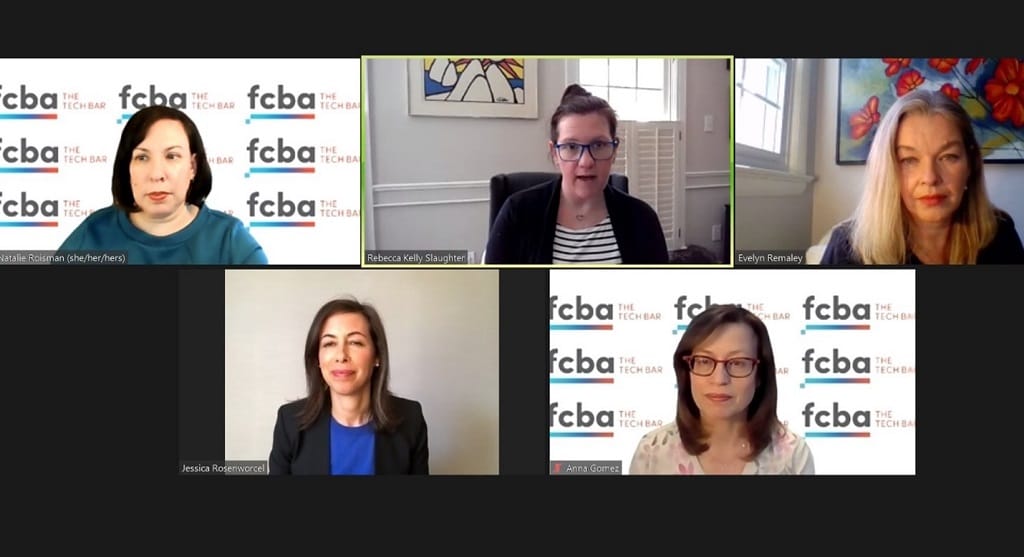Chairs Of FCC and FTC Point To Achievable Common Grounds Amid Political Discord
March 30, 2021 – With a change in administration comes a change in the party leadership structure for federal agencies, but that won’t sway the bipartisan tradition at the Federal Communications Commission and Federal Trade Commission, according to the acting chairs of those agencies. At a Federal C

March 30, 2021 – With a change in administration comes a change in the party leadership structure for federal agencies, but that won’t sway the bipartisan tradition at the Federal Communications Commission and Federal Trade Commission, according to the acting chairs of those agencies.
At a Federal Communications Bar Association event held Monday to celebrate Women’s History Month, the all-female panel of leaders spoke on the important bipartisan work their commissions were doing during the new Biden administration’s first few months in office.
“When we all work together, we go further and get more done,” Jessica Rosenworcel, Acting Chairwoman of the FCC, said in response to a question about political discord. Turning down the volume and finding ways to work in harmony will lead to success, she said.
Rebecca Kelly Slaughter, acting chairwoman at the FTC, expressed similar sentiment. There is a difference between strongly-held policy disagreements and personal vitriol, she said. Although we’ve had disagreements on policy, we maintain good relationships, she said, and those relationships are important to identifying where consensus is possible.
Both the FCC and FTC are comprised of five commissioners, selected by the president and approved by the senate. Three of the five members always share the current president’s political party. Because Joe Biden won the 2020 election, the majority party on each commission shifted from Republican to Democrat.
Challenges ahead
That’s not to say there aren’t disagreements, however, and how we see remedies and approach rulemaking at the FTC is “likely to change,” Slaughter said. She focused on a “whole-of-agency” approach to the challenges that have arisen from the COVID-19 pandemic, entering on racial justice and equity. Focus on COVID response and racial justice don’t need to be mutually exclusive, she said.
Slaughter added other challenges to that list, including ensuring small businesses have a fair competitive opportunity against big companies, issues with data privacy and telehealth, and fraud.
Congress has not been quiet about giving the FCC new responsibilities and challenges, Rosenworcel said, and we need to make those challenges a priority. Over $10 billion in funding has been appropriated for broadband programs for the agency to disburse, including the new Emergency Broadband Benefit Program and the Emergency Connectivity Fund. “We’re going to make a meaningful dent in the digital divide,” she said.
For Evelyn Remaley at the National Telecommunications and Information Administration, they have the challenge of distributing three new grant programs funded through the Consolidated Appropriations Act, the Broadband Infrastructure Program, the Tribal Broadband Connectivity Program, and the Connecting Minority Communities Program, aimed at expanding broadband for underserved Americans, including tribal lands, rural areas and minority communities.
A focus on female leadership
As a key component of the FCBA event was celebrating Women’s History Month, the three panelists were asked what it means to be a woman in their leadership positions.
Working during the pandemic has blurred the lines between work and home life, Remaley said. Men and women need to find ways to balance work and home and to be more productive in both, she said. We need to continue expanding our definition of leadership and bring in more diverse voices, she said, and that’s not unique to just women — men recognize this as well in leadership.
Slaughter, who gave birth to a child within days of getting her job at the FTC in 2018, said it’s an exciting challenge to balance work and family life, and provided her a unique opportunity to exemplify that the FTC is a workplace that values personal life as well. Having a personal life outside of work is important, and contributes to being a better at work, she said.
Being the only female commissioner at the FCC, that’s something you notice, Rosenworcel said. She expressed desire to see greater diversity at the agency, saying that more diversity leads to better decisions. She quoted Shirley Chisholm, the first black woman elected to Congress in 1968: “If they don’t give you a seat at the table, bring a folding chair.” That’s great professional advice, Rosenworcel said.
Both Remaley and Slaughter said they thought of the many unheard-of women who have paved the way for them to be where they are now, including Slaughter’s grandma who worked as a secretary in the senate and whom she had never met.











Member discussion